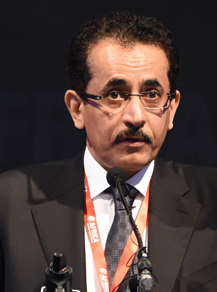The private path to meeting the UN's Sustainable Development Goals
The chief executive and general manager of the Islamic Corporation for the Development of the Private Sector discusses the role the private sector can play in achieving the UN’s Sustainable Development Goals.
The evidence speaks for itself.It is widely recognised that the private sector is a significant driver of dynamic and inclusive growth. In the wake of the conclusion of the 2015 Millennium Development Goals (MDGs), world leaders convened at the UN Sustainable Development Summit in September 2015 and unanimously adopted a new, universal set of Sustainable Development Goals (SDGs) which seek to complete what the MDGs did not achieve.
The SDGs are a total of 17 goals with 169 targets, aiming to achieve three remarkable objectives by 2030: ending extreme poverty, tackling climate change and fighting injustice and inequality. But how will they be funded? Both national and international public funds are unable to cover the financing requirements in order to accomplish the SDGs.
Achieving the goals of the SDGs requires the
mobilisation of private sector players. For example, microcredit programmes across the globe are breaking the cycle of poverty; investments in high-development impact projects are providing access to basic needs such as clean water and affordable energy; and green projects that focus on sustainable land use and biodiversity conservation are mitigating climate change.
Incorporating social and environmental sustainability criteria in businesses’ core strategies will transform them into real agents of change while maintaining profitability. Businesses should be inspired to integrate the notion of social and environmental impact because the very problems that the SDGs are trying to address – such as poverty, lack of education and inequality – hinder economic growth and opportunity on a global scale.
The role of Islamic finance
The business and moral case that underpins the three-pronged approach to sustainability is compelling. The opportunities include cost savings that are attributed to increased efficiency in business operations; the reduction of environmental impact and improved employee and customer retention; reduced risks as businesses
are more resilient to shocks and more flexible in a fast-changing world through enhanced engagement with stakeholders; increased competition among businesses as there is a constant push to innovate and stay ahead of the curve; improved revenues from greater involvement of the local economy and the gains that come with it; human capital development through better human resource management that invests in employees; and positive reputation building for businesses focused on sustainability practices.
In essence, the Islamic Corporation for the Development of the Private Sector (ICD), the private sector arm of the Islamic Development Bank (IDB) – the world’s largest sharia-compliant multilateral institution – focuses on supporting the development of our 57 member countries by stimulating the private sector in various ways. Our mandate is similar to other multilateral institutions, with the proviso that all of our operations must be sharia-compliant. Apart from providing vital capital, we also impart knowledge, help manage risks and catalyse the required participation of others to achieve development goals.
As our aim is to encourage development through access to fair finance, this makes the ICD’s mission entirely aligned with the UN’s SDGs. As an alternative type of funding, Islamic finance’s principles of financial stability, financial inclusion and shared prosperity are in perfect harmony with the SDGs of ensuring food security, healthy lives, gender equality, resilient infrastructure and shelter, as well as helping build peaceful and inclusive societies.
The inherent characteristics of Islamic finance lend themselves well to facilitating and promoting sustainable development, such as the risk-sharing modes of financing that promote assets and enterprise, the close link with the real economy, and the strong emphasis on redistribution of wealth and opportunity, among others. In summary, the ultimate goal of Islamic finance is to create a sustainable, equitable and socially responsible financial system, which shows striking similarities to
the spirit of the SDGs.
In such volatile and uncertain times, all stakeholders are responsible for addressing urgent global problems. However, we need to see even greater engagement of the private sector and we need to harness the capacities of business and industry on all fronts to innovate if we are to yield tangible solutions for sustainability. Indeed, major corporations should be more proactive and become involved with the global agenda, and should strive to be a part of the development story and not just a beneficiary of it. As private sector activity comes in many shapes and sizes, it will always remain at the heart of sustainable economic development.



